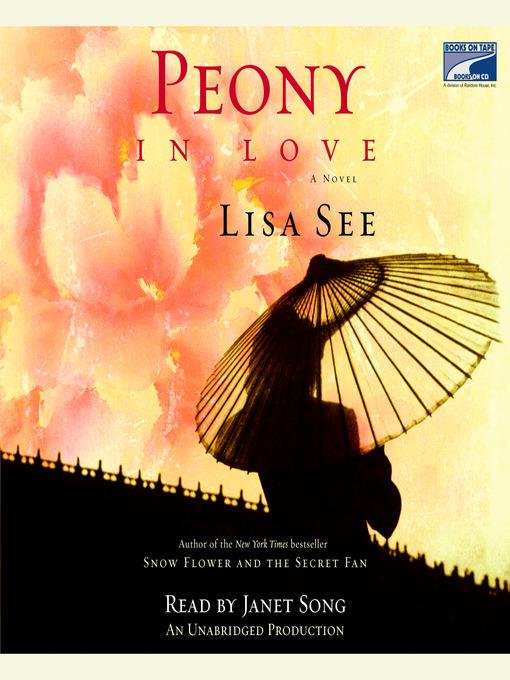
Peony in Love
A Novel
کتاب های مرتبط
- اطلاعات
- نقد و بررسی
- دیدگاه کاربران
نقد و بررسی

Janet Song's lovely smoky voice is the perfect medium for this deeply compelling story, inspired by real events in seventeenth-century China. Peony is a cloistered daughter of the prosperous Chen family in the years just following the bloody end of the Ming Dynasty and the ascension of the Manchus. Her obsession with the iconic opera THE PEONY PAVILLION, about a girl much like herself who dies of love for a man she's forbidden to marry, sets this fascinating tale in motion. Song inhabits Peony with such subtlety and grace that you are only rarely aware that acting is occurring; instead you seem to live inside Peony's head, looking directly at her gorgeous, haunted, and vanished world. An outstanding performance and a flawless production. B.G. Winner of AudioFile Earphones Award (c) AudioFile 2007, Portland, Maine

Starred review from April 23, 2007
S
et in 17th-century China, See’s fifth novel is a coming-of-age story, a ghost story, a family saga and a work of musical and social history. As Peony, the 15-year-old daughter of the wealthy Chen family, approaches an arranged marriage, she commits an unthinkable breach of etiquette when she accidentally comes upon a man who has entered the family garden. Unusually for a girl of her time, Peony has been educated and revels in studying The Peony Pavilion
, a real opera published in 1598, as the repercussions of the meeting unfold. The novel’s plot mirrors that of the opera, and eternal themes abound: an intelligent girl chafing against the restrictions of expected behavior; fiction’s educative powers; the rocky path of love between lovers and in families. It figures into the plot that generations of young Chinese women, known as the lovesick maidens, became obsessed with The Peony Pavilion
, and, in a Werther
-like passion, many starved themselves to death. See (Snow Flower and the Secret Fan
, etc.) offers meticulous depiction of women’s roles in Qing and Ming dynasty China (including horrifying foot-binding scenes) and vivid descriptions of daily Qing life, festivals and rituals. Peony’s vibrant voice, perfectly pitched between the novel’s historical and passionate depths, carries her story beautifully—in life and afterlife.

This magical, mystical, floridly romantic ghost story is set in seventeenth-century China. Peony, almost 16 and betrothed to a man she has never met, meets her true love, poet Wu Ren, during a performance of her favorite opera, "The Peony Pavilion." Its heroine, Liniang, dies of "lovesickness." As her marriage approaches, Peony, like Liniang, starves herself to death, discovering, on her deathbed that her husband-to-be is Wu Ren. Peony spends the next 29 years haunting, and helping, Wu Ren's two wives. Sedately paced but lively, enhanced by period music, this ghost story is more entertaining than scary. Jodi Long's solid portrayal of Peony's heartbreaking romantic deprivations goes a long way to suspend disbelief, and Long's feisty older women add comic moments. M.T.B. (c) AudioFile 2008, Portland, Maine

Starred review from February 1, 2008
Teenaged Peony lives in late 16th-century China, protected by her wealthy family, her entire life arranged for marriage and the birth of sons. Prior to her marriage, she overhears passages from the famous opera "The Peony Pavilion" and has a brief but life-altering conversation with a very handsome manboth strictly forbidden to an unmarried maiden. The "love-sickness" brought on by these secrets leads to Peony's death by self-starvation, as she pines for the man whose name she does not know. After her death, owing to a lapse in protocol, Peony is condemned to wander the earth as a "hungry ghost." The descriptions of her ghostly existence over the decades are interwoven with her devotion to the poet she could have married, the women he later marries, other wanderers, and "The Peony Pavilion" itself. As the book reveals, during the Manchu Dynasty women were oppressed severely, even in death; the foot-binding process depicted here is truly horrible. The writing is compellingly exotic and vivid, and listeners are drawn into this world by the beautiful voice of Janet Song, who brings Peony's journey to life. Highly recommended for public libraries, especially those with collections for young adults.Barbara Valle, El Paso P.L., TX
Copyright 2008 Library Journal, LLC Used with permission.

























دیدگاه کاربران